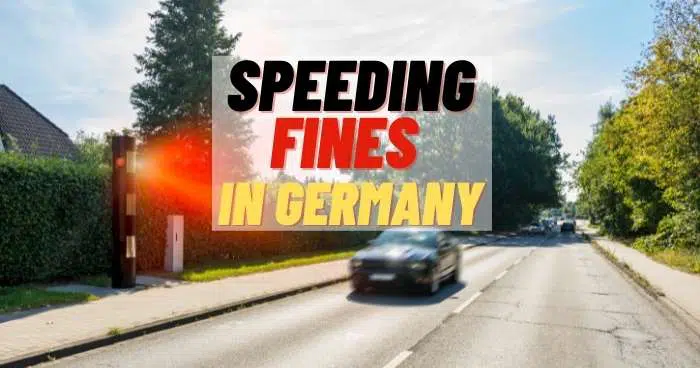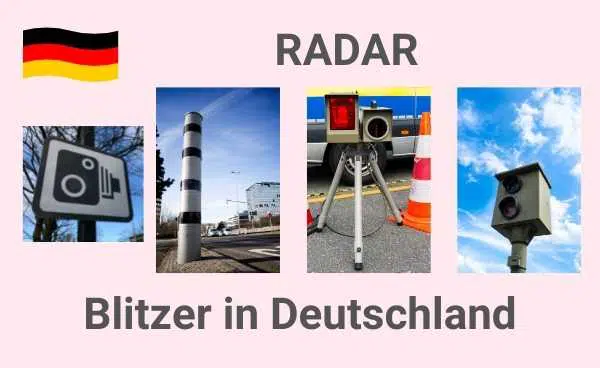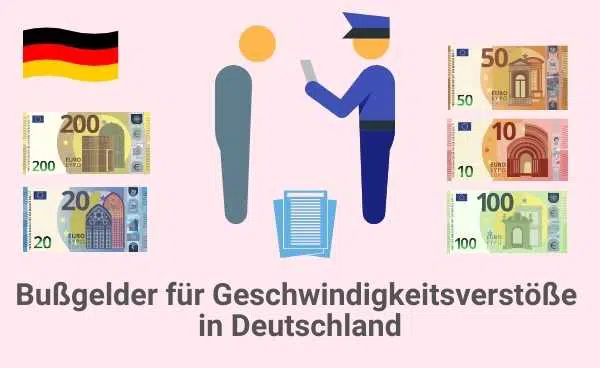As many of you might know, Germany is one of the few countries with no speed limits on its highways. Except for some stretches where the speed limits are restricted. Alongside those speed limits, there are pretty high traffic and speeding fines in Germany, which has been reinforced recently.
I provide you with a complete overview of the typical speeding and traffic fines in Germany that I was able to find for you. Even some of those might sound severe, I can tell you one thing: driving a car in Germany is still accessible, and you will learn to get around here well without violating any laws.
Key takeaways
1) Speed limits in Germany start at 5 km/h and end at 130 km/h.
2) Speed limits in Germany are called “Tempolimits”.
3) There is no maximum speed limit on the Autobahn in Germany.
4) Note, however, that there can be speed limits on the Autobahn at any time.
5) Speed cameras in Germany are either stationary or mobile.
6) If you are caught, you will receive a notification by post a few days or weeks later.
7) Fines for speeding in Germany vary between €30 and €800.
Topics in this article
Speed limits in Germany >>
How do speed cameras in Germany work? >>
Penalties for speeding in Germany >>
Highest traffic fines in Germany >>
Alcohol limit in Germany for drivers >>
What happens if I consume drugs and drive in Germany? >>
What are the speed limits in Germany?
Based on where you are, the speed limits differ. There are some general rules that you should always keep in your mind. If there are exceptions from that rule, you’ll see them alongside the road. Those signs will inform you about any changes to those standard rules.
The speed limits I am talking about here are for PKW or regular cars. For RVs, trucks, agricultural machinery, construction machinery, and buses. Motorbikes have to follow the rules of regular cars all the time.
In general, speed limits in Germany are based on kilometers per hour or “km/h”. Here is a quick overview of the most critical speed limits or “Tempolimits” that are in place in Germany with the corresponding conversion in miles per hour (mph).
- 30 km/h = 18.6 mph
- 50 km/h = 31.1 mph
- 100 km/h = 62.1 mph
- 130 km/h = 80.8 mph
Speed limits in Germany in town
There is a speed limit of 50 km/h or roughly 31.1 mph in town. Very often, especially in quieter residential zones with narrow roads, you will also see a speed limit of 30 km/h or roughly 18.6 mph more often. The speed traffic signs usually look like the following ones:
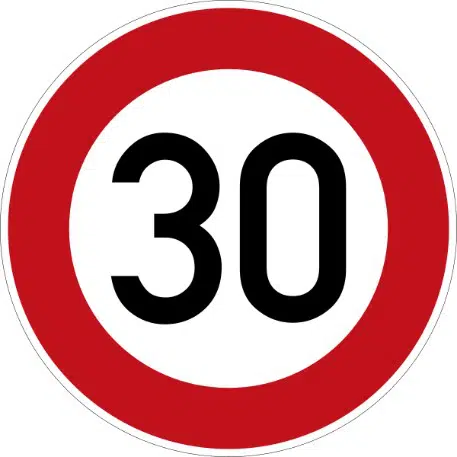
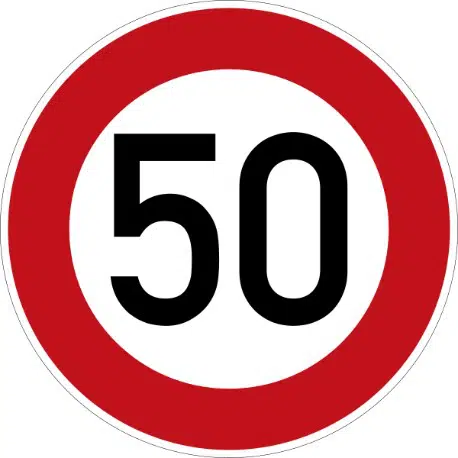
There are a few exceptions on inner-city roads. In residential zones, you might find the following sign:
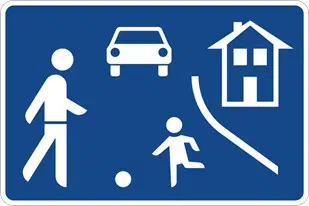
This stands for “Verkehrsberuhigter Bereich“commonly known as “Spielstraße”, meaning limited traffic area or playing street. You can see them at the beginning of roads that lead through densely populated residential areas. As soon as you see this sign, you should to drive in “Schrittgeschwindigkeit” or walking speed, which most likely translates to a speed of 5 km/h.
On the other end, you may sometimes see signs that allow you to drive at a speed of 60 km/h or 37.3 mph.
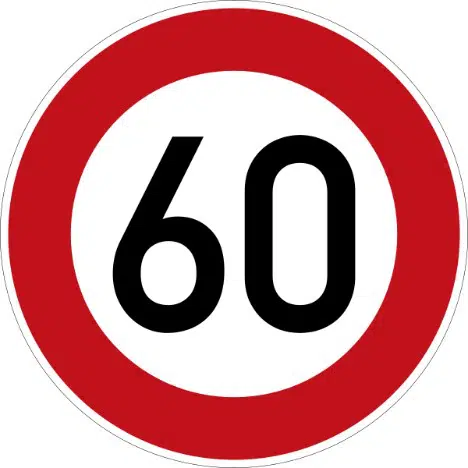
Those are used on roads with a higher traffic volume in town.
Speed limits in Germany out of town (Landstrasse)
Out of town, on so-called “Landstraßen” (country roads), you may drive up to 100 km/h or 62.1 mph unless marked otherwise.
Is there a maximum speed limit in Germany on the “Autobahn” (highway, freeway)?
There is basically no maximum speed limit in Germany on the “Autobahn”, or highway and freeway. But, please be aware that there might be some speed limits in place at any point in time.
Commonly, speed limits do appear nearby construction areas or narrow curves, and it’s set to 80 km/h or 49.7 mph. On higher bridges, you may also see the speed limit of 100 km/h (= 62.1 mph) or 120 km/h (= 74.6 mph).
From what I have observed until now, these are also the favourite spots where speed cameras are installed.
Is there a minimum speed limit in Germany?
According to an article from ADAC you have to be able to drive at least 60 km/h or 37.3 mph on the “Autobahn” to be eligible to use it.
A general rule in place says that you should not drive slower than necessary and hinder other drivers without a given reason. This means in case there is thick fog, heavy rain, or lots of snow, you may drive slower than usually, of course. You must ensure that you do not put anyone in danger with your driving speed.
How do speed cameras in Germany work?
One of the main questions you might have is how speed cameras in Germany work. Basically, there are two different types of speed cameras in Germany. There are stationary and mobile speed cameras in use. Mobile, in this case, does not mean that they are self-driving but more temporary in place set up by the local police.
The temporary ones can measure your speed out of the rear window of a car or from boxes located close by the roadside. The police force can also measure your driving speed with the help of cameras installed in their cars.
Sometimes police officers even use portable cameras on the roadside and measure your driving speed from there. If you are a foresighted and careful driver, you will for sure recognize all speed traps in Germany quite easily.
Are there speed cameras in Germany, and where are they placed?
Stationary speed cameras in Germany are usually placed on either a crossing, within tunnels with a speed limit on highways, or inner-city roads. There is usually a set of cameras mounted to the left and right walls in tunnels. On crossings, you may find them either mounted to traffic light poles or in their newer version as a grey inobtrusive cylinder with several cameras in place on the roadside.
When driving on highways and country roads, you may see them mounted on separate poles with a camera box on top that measure your speed from there. Here are some examples on Wikipedia from Germany (and Austria). Due to their look, speed cameras are sometimes called “Starenkästen” in German.
Is there any tolerance for speed cameras in Germany?
According to the Wikipedia article mentioned above, some tolerances will be applied if you run into one of Germany’s different fixed speed traps.
Speed cameras, radar measuring devices, or laser guns:
- up to 100 km/h 3 km/h are deducted as a tolerance value
- from 101 km/h 3 % are deducted.
ProViDa: 5 %, minimum 5 km/h.
Driving behind with an official vehicle
- with adjusted speedometer: 15
- with non-adjusted speedometer: 20 %
Tolerance can be important if you get caught by a speed camera in Germany.
Since I have significantly reduced my driving speed compared to a few years ago, I can tell you how I used to proceed in the past when it came to speed and tolerance of speed cameras: I used to set the cruise control 5 to 7 km/h above the actual speed limit in a certain area. And I never got caught by the speed camera doing that. But that doesn’t mean I’ve never been caught by a speed camera. And please don’t take this as an advice or recommendation. It’s only my personal experience.
What happens if I get caught by speed cameras in Germany?
So you might ask what happens if you get caught by a speed camera in Germany. There are hardly times when they stop you right away. That will only happen if police officers measure your speed with a laser gun or if they drive behind you and catch you that way.
In this specific case, you will be stopped, and if you are lucky you can continue driving, you will receive a warning on-site or, in rare cases, lose your driving license right away. That usually happens only if you are driving under the influence of alcohol or forbidden substances.
In all other cases, you can continue driving first of all.
How long does it take until I get the speeding penalties in Germany?
After you are caught speeding on camera, you will receive an official “Bußgeldbescheid” (notice of a fine – this is how they call speed violation fines in German) by postal services a few weeks later. In it, they explain to you the “Tatbestand”, the facts of the matter, how many points or “Punkte in Flensburg” or “Punkte” you will get and how much money you will have to pay.
From my own experience, sometimes it takes a week, other times takes 3-4 even 6 weeks until you get the notification.
If someone else drove your car, and you can prove that you can explain the situation, file an appeal. You can always file an appeal, but it will not be successful in most other cases.
In order to be able to appeal, I recommend to take out a legal insurance in Germany that covers traffic disputes. Read here all details:
Legal Insurance in Germany: Do Expats Need It?
What is Zeugenfragebogen – Witnesses Questionnaire in Germany?
In case of speeding fines, normally you get the chance to inform the authorities that someone else drove your car.
You’ll get a so-called Zeugenfragebogen (witnesses questionnaire) and you are asked to provide the details of that respective person.
Once the authorities have the name and the contact details of the person who actually drove the car, you don’t have to worry that you will get the fine.
What are the speeding fines in Germany?
Penalties for speeding depend on two things:
First, of course, the measured speed minus the tolerance based on the measuring method.
Second, it’s also considered where the speeding violation happened. As previously mentioned, the traffic fines in Germany were recently updated in November 2021.
The speeding fines displayed below are valid for cars without trailers.
Passenger cars: exceeding the speed limit in inner-city limits. Speeding fines in Germany from 09.11.2021:
| Violation | Penalty | Points | Driving ban |
| Up to 10 km/h | 30 € | 0 | none |
| 11 km/h – 15 km/h | 50 € | 0 | none |
| 16 km/h – 20 km/h | 70 € | 0 | none |
| 21 km/h – 25 km/h | 115 € | 1 | none |
| 26 km/h – 30 km/h | 180 € | 1 | 1 month (only if caught twice within one year) |
| 31 km/h – 40 km/h | 260 € | 2 | 1 month |
| 41 km/h – 50 km/h | 400 € | 2 | 1 month |
| 51 km/h – 60 km/h | 560 € | 2 | 2 months |
| 61 km/h – 70 km/h | 700 € | 2 | 3 months |
| Above 70 km/h | 800 € | 2 | 3 months |
Passenger cars: exceeding the speed limit outer city areas. Speeding fines in Germany from 09.11.2021:
| Violation | Penalty | Points | Driving ban |
| Up to 10 km/h | 20 € | 0 | none |
| 11 km/h – 15 km/h | 40 € | 0 | none |
| 16 km/h – 20 km/h | 60 € | 0 | none |
| 21 km/h – 25 km/h | 100 € | 1 | none |
| 26 km/h – 30 km/h | 150 € | 1 | 1 month (only if caught twice within one year) |
| 31 km/h – 40 km/h | 200 € | 1 | 1 month (only if caught twice within one year) |
| 41 km/h – 50 km/h | 320 € | 2 | 1 month |
| 51 km/h – 60 km/h | 480 € | 2 | 1 months |
| 61 km/h – 70 km/h | 600 € | 2 | 2 months |
| Above 70 km/h | 700 € | 2 | 3 months |
What happens if I don’t pay the speed ticket charges in Germany?
As you can see for the minor violations, the speeding fines are not as high as someone might expect.
But what happens if you either don’t want to pay or simply forget to pay your traffic fines in Germany?
There is one thing I’d like explain to you first:
There is a difference between
- “Strafzettel” (ticket)
- and a “Bußgeldbescheid” (fining notice) in Germany
You should pay the traffic fines in Germany within a week after arrival.
In Germany they call speeding ticket “Bußgeldbescheid”.
If you don’t have reasonable doubt regarding your speeding ticket, you should pay it within that timeframe. A fining notice is delivered within six weeks.
Traffic fines in Germany delivered with confirmation of delivery
In Germany, you also usually receive a so-called certificate of service. This serves as proof that a document has been formally served on you as the recipient. Upon receipt of the notice, the following measures apply:
- A record is made of who, when, where, and how the document was served
- The document is returned to the sender and thus becomes legally effective
- The recipient can no longer evade his responsibility
- From the moment of acceptance, the deadlines can start to run
- With a barcode, tracking and tracing are also possible
After receiving your “Bußgeldbescheid” you have 14 days to object. If you don’t do that and you refuse or forget to pay within another 14 days, the fees will be higher with your first reminder. That reminder usually arrives within another six weeks after the payment deadline.
You might be charged with forced detention if you do not consider paying the fees mentioned in the reminder within another 14 days. So basically, there is no way to refuse to pay the “Bußgeldbescheid” that comes along with your speeding fines.
Can I lose my driving license for speeding in Germany?
Yes, as previously shown in the two tables above about the fines that come along with a speeding ticket, you can lose your driving license for one month up to three months.
Do I get points for speeding in Germany?
Yes, you may also get points for speeding in Germany. The maximum amount of points you can actually get is two for one offense at a time.
What are the highest traffic fines in Germany?
There are several occasions when you can receive one of the highest traffic fines in Germany.
“Abstand” or driving distance
If you are not keeping enough distance between the car in front of you and your car, you can be fined up to 400 Euro.
This is one of the highest fines in Germany and you have to be very cautious on this topic.
Let me give you the basic rules for the driving distance in Germany:
Driving distance in cities
In cities (or urban areas), you must keep a distance of about one second. At a speed of 50 km/h, this corresponds to 15 meters or three car lengths.
Driving distance outside cities
Outside of cities, you must have a distance of at least 2 seconds. Depending on your speed, you can estimate the distance by dividing your speed by 2 and translating it into meters.
Here are a couple of examples:
You drive with 100 km/h. 100 / 2 = 50 meters distance (at least)
You drive with 150 km/h. 150 / 2 = 75 meters (at least)
Although I am not a racing driver, I was once caught by the distance measuring camera. I was driving at 120 km/h and only had a distance of 25 meters. That cost me more than 100 euros and I got a point in Flensburg at the time (if I remember correctly).
“0.5 Promille Grenze” for alcohol or 0.5 promille limit
In that case, fines up to 3,000 Euros are possible depending on the amount of alcohol you consume.
Violation of drug law
If you violate current drug laws, you can be fined up to 1,500 Euros if you get caught for the third time.
What is the alcohol limit in Germany for drivers?
As mentioned above, the alcohol limit in Germany for drivers is currently at 0.5 promille.
What happens if I consume drugs and drive in Germany?
If you consume any prohibited substances (drugs) and drive your car in Germany, you will, first of all, lose your driving license for at least a month. Alongside it, depending on the drug you used and whether they catch you with more drugs in your car, they might even take legal action and file a lawsuit against you.
During that process, you might even lose your driving license for a more extended period – if not forever. To get back your driving license, you will have to do your MPU in Germany, the abbreviation for “Medizinisch-Psychologische Untersuchung” (medical and psychological examination).
The MPU and the resulting opinion of an experienced expert are required by driving license authorities even to consider your driving capabilities for review. After that, they either revoke or reissue a driver’s license.
Conclusion
Even if Germany is said to be a car-lover nation, there are some rules you should obey. If you do that, you can enjoy the pleasure of driving your car on usually well-cared roads and highways that are in the best condition. I hope this little guide about traffic and speed limit fines in Germany is helpful for you.
USEFUL INFORMATION AROUND CARS IN GERMANY
> How to buy a car in Germany as a foreigner
> How To Find A Car In Germany On Internet
> 5 Steps for Registering A Car In Germany
> Buying A Car in Germany For Export
> Car Tax in Germany | Car tax Germany calculator explained

